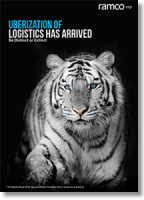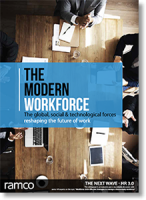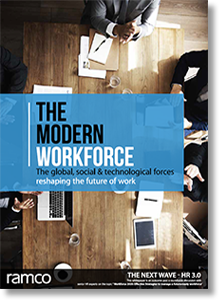The Modern Workforce: The Global, Social & Technological Forces Reshaping the Future of Work
This white paper details the technological advancement of globalization and how powerful forces are expected to have a profound impact on traditional HR and talent management policies, it also throws light on how you can leverage a multi-generational agile diverse workplace digitally ready for the modern workforce.
Businesses today are operating in a period of stunning change and development.
From technological advancement to the effects of globalization and societal trends, several powerful forces are currently redefining the way we work.
This shift has resulted in a profound impact being felt across the field of human resources (HR), with traditional policy and talent management-based HR models being challenged by an ever more connected and diverse global workforce.
Modern technology lies at the heart of this transformation and has already been the catalyst for much change.
A raft of digital platforms and tools are now on hand to help transform employee engagement practices, while performance management and recruitment strategies are being shaped by an abundance of analytics and data.
In the not-too-distant future, the rise of robotic automation (bots) and machine learning is also set to further absorb a diverse range of roles, resulting in the need for creative upskilling and role reassignment.
The employee of today is expressing their desire for freedom and fluidity in the workplace, as evidenced by the dramatic rise in contingent workers around the globe, and the number of full-time employees seeking flexible working conditions.
However, the needs and expectations of these workers also vary greatly across the most generationally-diverse workforce in history - an unprecedented situation that is being fuelled by a range of economic and social factors.
The implications of these complex issues are being felt in businesses around the world in many different ways and to varying degrees.
However, for HR professionals, it is important to gain a clear understanding of the forces at play and the potential impacts to the businesses you support, to ensure you are well placed to evolve and keep pace with the changes that lie ahead.
The Next Wave - HR 3.0
The practice of human resources management has undergone a number of key transformations over the past fifty years, moving from the Industrial Revolution into the Personnel Era, before embracing the strategic approach propagated by thought-leaders like Dave Ulrich.
Now, HR is transitioning into a new model, one that requires a deep understanding of global labor markets, technology and an increasingly agile and generationally-diverse workforce.
It is a shift that is becoming increasingly recognized across the industry, with Deloitte's Human Capital Trends 2016 report suggesting modern topics like design thinking, analytics, and digital HR are higher on the priority list of HR leaders worldwide than traditional workforce management.
What’s Related



Favorites





